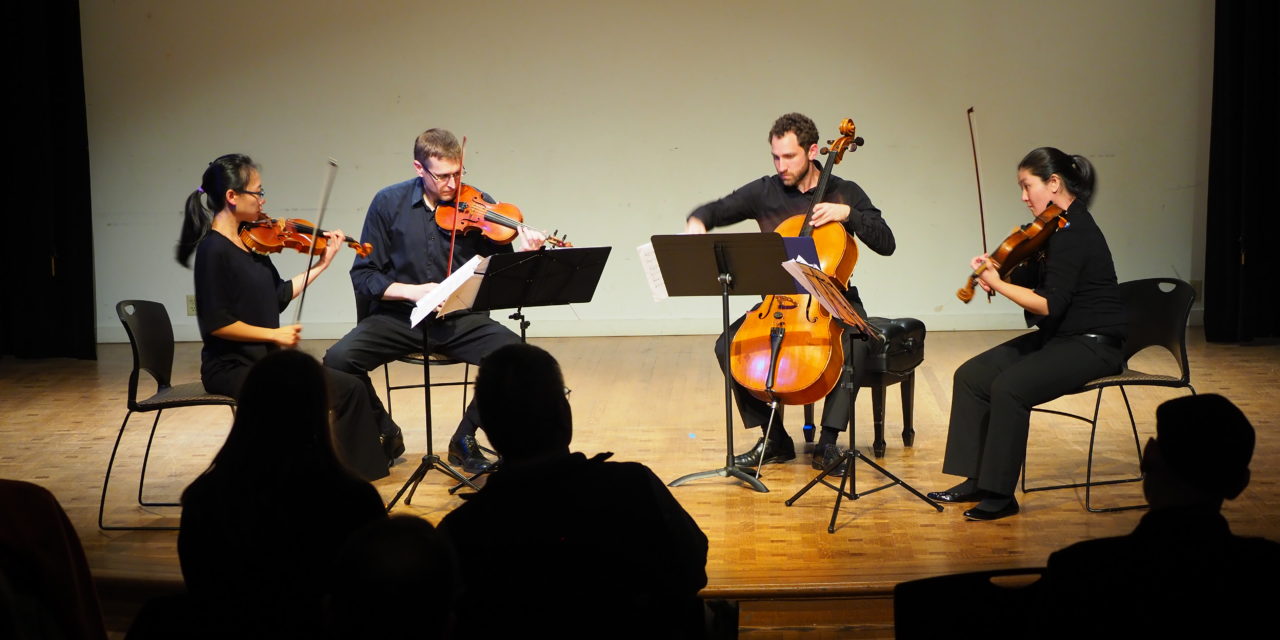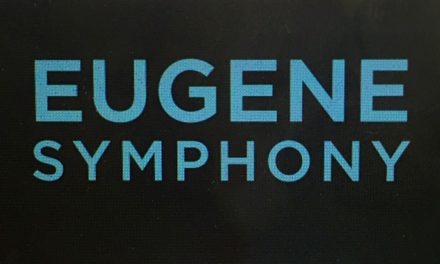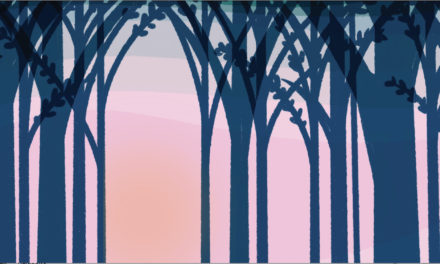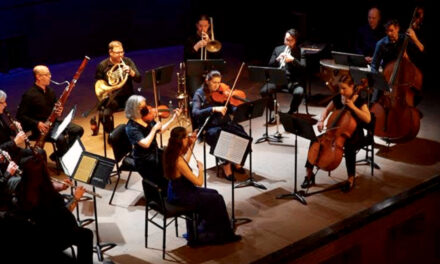(Above: The Delgani String Quartet plays original compositions by a half-dozen Eugene-area composers in Local Sounds, Local Stories at the Wildish Community Theater)
By Randi Bjornstad
Two years ago, Eugene biochemist-turned-composer Anice Thigpen premiered her first opera, The Woman of Salt, on the stage of Springfield’s Wildish Community Theater.
At the time, Thigpen figured that might be her only foray into composing, but it didn’t turn out that way. On Sept. 7 and 8, in a collaboration with other Eugene-area musicians and vocalists, a concert called Local Sounds, Local Stories will be performed at the Wildish.
The production falls under the auspices of A² Productions, Thigpen and her neurosurgeon and executive spouse Andrea Halliday’s art, song, and dance production company that “exists to give voice to the unsung and light to the unseen.”
“When I finished The Woman of Salt, both Andrea and I thought that was that,” Thigpen said. “That opera was my own story of a woman of a certain age processing traumatic events from her past, but instead of the end, it was the beginning for me. I continued to want to write music, and I came up with ideas for five more projects, and Andrea and I started A² Productions last fall.”
That’s where the collaboration with other area musicians began to fall into place.
“We had heard the Delgani String Quartet play a couple of seasons ago, and I was absolutely transfixed by Kimberlee Uwate’s transcendent playing of the viola. It was my first experience of really hearing and feeling the power of the viola, and I was incredibly moved and excited by her performance.”
Thigpen already knew that she wanted to do another musical work involving soprano Laura Wayte, who sang in The Woman of Salt, “because Laura’s voice is to me what Kimberlee’s viola is to me,” she said.
Another piece fell into place when Eric Alterman, Delgani’s cellist, “let us know that if I ever wrote a piece for a string quartet, they would like to perform it,” Thigpen said.
Because she describes herself as “muse driven, not commission driven,” Thigpen didn’t know when that might happen, but then she realized a story already had been forming itself in her creative mind for several years, ever since she attended a talk by Naomi Kirtner, titled My Unorthodox Year of Kaddish, at Temple Beth Israel.
Not Jewish herself, Thigpen nonetheless was enraptured by Kirtner’s account of traversing the grief of her 23-year-old daughter Talia’s death through the ancient practice of a sequence of prayers known as Kaddish, “finding the courage even to live through that, and then to allow herself to be vulnerable and to find wisdom and strength both intellectually and emotionally.”
Kirtner’s story resonated especially with Thigpen because she had lost six people — a sextet, she called it — who were very close to her, “and I think I went, ‘Oh, if she did that, maybe I can do something like that, too,’ in spite of the fact that in my world , we tend to walk away from death and often don’t really process it.”
Further impetus came from another talk Thigpen attended, by a woman named Eva Mozes Kor, who with her twin sister Miriam was subjected to — but survived — medical experimentation by Josef Mengele in the Nazi concentration camp at Auschwitz.
The final catalyst was discovery of a thousand-year-old poem by a Spanish poet of Moorish descent named Judah Halevi, that opened with the line, “It’s a fearful thing to love what death can can touch.”
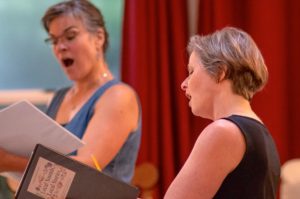
Laura Waite and Gretchen Farrar rehearse for their roles in the premiere of Anice Thigpen’s string quartet, “What Death Can Touch”
“As I read that, the Bach Prelude in C Minor played in my body — I felt as if I were standing in a beam of light where time and space became irrelevant,” Thigpen said. “Everything for my string quartet, ‘What Death Can Touch,’ came out of the combination of all those things. It became my Kaddish for my six dear, lost ones, and in the process of writing it, I felt as if they came home, and I was able to revisit my memories of them without so much grief and loss. The experience transformed me.”
Vocalists Laura Wayte and Gretchen Farrar sing the premiere performance of Thigpen’s What Death Can Touch. The performance also includes projection of a visual interpretation of a Kaddish poem, created by artists Lillian Almeida and Sunny Selby.
Five other composers also have pieces in the program:
- Terry McQuilkin — Invisible Light is based on the hymn tune, Detroit, published in the early 19th-century shape-note hymnbook. The one-movement work is a series of variations on the original tune, which explores multiple musical traditions to inform the character of the piece. A listener may hear 13th-century contrapuntal song, as well as inflections of jazz.
- David Sprung — This string quartet was composed in 1959 while Sprung was a graduate student at Princeton University, studying with Roger Sessions. A decade ago, Sprung revisited the work and made substantial revisions. The piece uses well-known techniques such as cyclicism, where motives initially presented reappear in other movements. Delgani will play the Scherzo from the quartet.
- Andrew Lewinter — Theme and Variations is the second movement of a larger four-movement work. The neo-romantic movement also works as a standalone piece, beginning with a brief introduction, after which the quartet plays a hymn-like theme in E Major, followed by four variations in different keys, each with a unique mood before concluding with a resolution in the original key.
- Paul Safar — His original compositions continue the western classical music tradition as well as incorporate his love of jazz, pop and rock styles. Safar pushes his creative abilities in each new project while maintaining accessibility for an audience. Delgani will perform Capriccio from Safar’s Quartet in Red, Black, and Blue along with The Walrus and the Carpenter with orator Rickie Birran. The latter, commissioned by Delgani in 2015, appears on their first album, Invisible Light.
- John Lundblade — His relationship with Delgani and vocalist Siri Vik goes back years through recording projects of his songs. In Local Sounds, Local Colors, Delgani and Vik perform Lundblade’s settings to music of poetry by Sara Teasdale, Federico García Lorca, and W. B. Yeats.
Local Sounds, Local Stories
When: Concerts at 7:30 p.m. on Saturday, September 7 and 3:00 p.m. on Sunday, September 8; pre-concert talks with Eugene composer Anice Thigpen at 6:45 p.m. on Saturday and 2:15 p.m. on Sunday
Where: Wildish Theater, 630 Main Street, Springfield
Details: A-Squared Productions presents Delgani String Quartet in Local Sounds, Local Stories. Performing works by Eugene-based composers, the Delgani String Quartet celebrates the start of its fifth anniversary season through collaboration with some of the area’s most celebrated composers and vocalists.
Performers: Delgani String Quartet (Violinists Wyatt True and Jannie Wei, violist Kimberlee Uwate, and cellist Eric Alterman) and vocalists Laura Wayte, Gretchen Farrar, and Siri Vik
Cost: $10-$35, available at the ticket office, 541-868-0689, or online at wildishtheater.com

